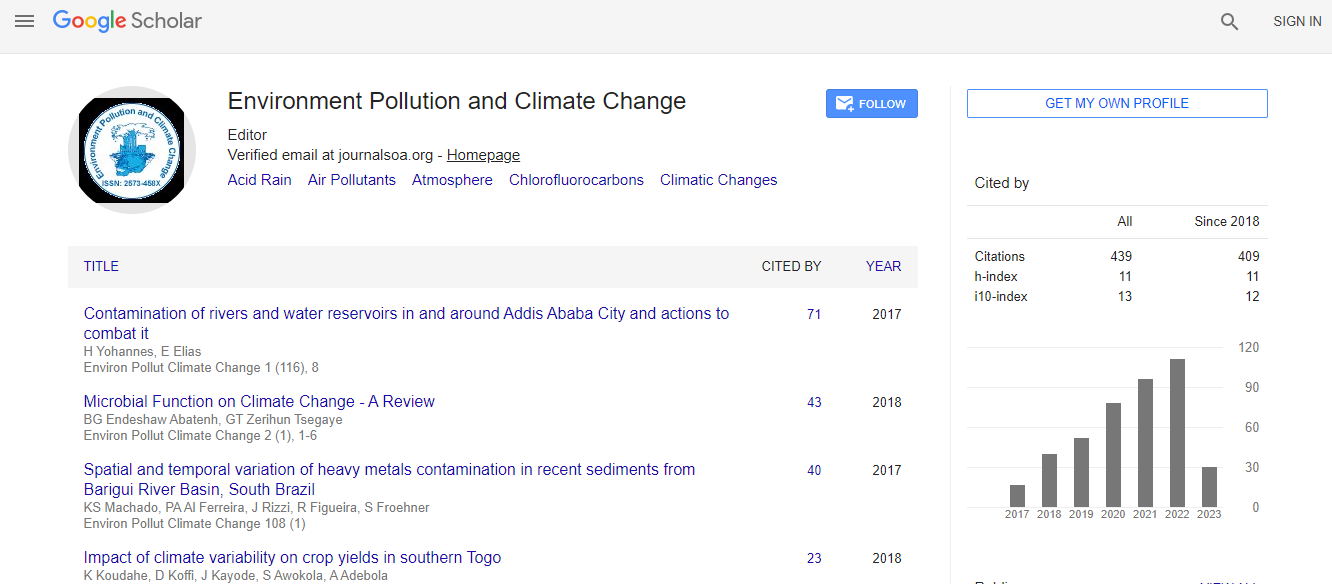Our Group organises 3000+ Global Conferenceseries Events every year across USA, Europe & Asia with support from 1000 more scientific Societies and Publishes 700+ Open Access Journals which contains over 50000 eminent personalities, reputed scientists as editorial board members.
Open Access Journals gaining more Readers and Citations
700 Journals and 15,000,000 Readers Each Journal is getting 25,000+ Readers
Google Scholar citation report
Citations : 431
Environment Pollution and Climate Change received 431 citations as per Google Scholar report
Environment Pollution and Climate Change peer review process verified at publons
Indexed In
- Google Scholar
- Publons
- Euro Pub
- ICMJE
Useful Links
Recommended Journals
Share This Page
Arctic sea ice decline over the past 40 years
Joint Event on 5th World Conference on Climate Change & 16th Annual Meeting on Environmental Toxicology and Biological Systems
Jean-Claude Gascard
French National Center for Scientific Research, France
Keynote: Environ Pollut Climate Change
Abstract
The Arctic sea ice extent and thickness has declined by 50% over the past 40 years and consequently the ice volume which is a by-product of both Arctic sea ice extent and thickness has declined by 75% during summer. This is a huge change among all the elements contributing to Earth’s climate change. To understand and to explain this situation and to find out about its origin, it is essential to look at winter, in addition to summer conditions. Based on freezing degree days (FDD) accumulating all over the freezing season each year, starting in September and ending in May the following year, we are able to demonstrate that the decline in Arctic sea ice over the past 40 years is largely due to milder winters and the lack of freezing in winter. Sea ice newly formed during each winter is not able to balance the Arctic sea ice melting during the summer season even if there are more new ice formed due to a larger ice free ocean undergoing freezing every year. During the past two years, we registered a sharp drop of more than 10 cm of sea ice thickness compared to the previous year indicating the phenomenon we just described as accelerating. This is mainly due to warm air masses and warm oceanic waters advected from the South to the Arctic Ocean. Based on these results, it is highly probable and almost inevitable that Arctic sea ice will disappear in summer within the coming 10 years with large consequences for the Earth’s climate in the Northern Hemisphere and also globally. We are already experiencing frequent cold air outbreaks at mid latitudes as well as heat waves propagating up to the North Pole as described recently (February 25, 2018) by the weather previsionist (Etienne Kapikian) from Meteo-France. Recent Publications 1. Gascard J-C, Riemann-Campe K, Gerdes R, Schyberg H, Randriamampianina R, et al. (2018) Future sea iceconditions and weather forecasts in the Arctic: implications for Arctic shipping. AMBIO 46:355–367. 2. Gascard J-C, et al. (2015) General introduction to the DAMOCLES special issue. Atmospheric Chemistry and Physics 15:5377–5379. 3. Bourgain P, Gascard J-C, Shi J and Zhao J (2013) Large scale temperature and salinity changes in the upper Canadian Basin of the Arctic Ocean at a time of a drastic Arctic oscillation inversion. Ocean Sciences 9:447–460. 4. Bourgain P and Gascard J-C (2012) The Atlantic and Pacific waters variability in the Arctic Ocean from 1997 to 2008. Geophysical Research Letters 39. 5. Bourgain P and Gascard J-C (2011) The Arctic Ocean halocline and its interannual variability from 1997 to 2008. Deep Sea Research I 58:745–756.Biography
Jean-Claude Gascard is a Physical Oceanographer specializing in Deep Ocean Convection and Polar Oceanography. He started his observations in the Mediterranean Sea in the 1970s leading to his Doctorate Degree in 1977, then in the Labrador Sea and in the Greenland Sea in the 90s when he published a paper in Nature about Sub-mesoscale Coherent Vortex (SCV) generated during deep ocean convection. This is a major element of the thermohaline ocean circulation mechanism often called the great conveyor belt. His first Arctic expedition was in 1983–1984 during the MIZEX experiment in Fram Strait. He led large European projects in the Arctic during the International Polar Year: the DAMOCLES project from 2005 to 2010 and more recently the ACCESS project (2011-2015) a multidisciplinary Arctic project for understanding the impacts of the Arctic climate change on the economy and the society. He has published more than 100 papers and edited four books.
E-mail: jga@locean-ipsl.upmc.fr

 Spanish
Spanish  Chinese
Chinese  Russian
Russian  German
German  French
French  Japanese
Japanese  Portuguese
Portuguese  Hindi
Hindi 
